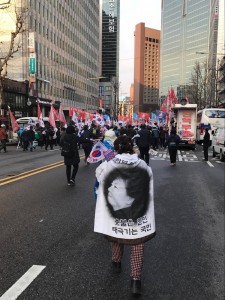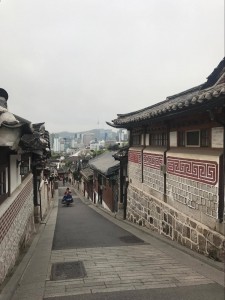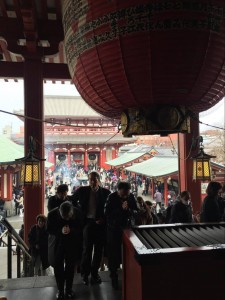When I originally told people I was planning on doing a year abroad, most of the responses I got back were – “but you are already studying abroad”. While yes, I am an international student, originally from Mexico, I guess you could say I already had a study abroad experience. However, the reality is that no past experiences could have prepared me for the wonderful challenging year I had as a participant of the 3-Campus Programme. Doing a year aboard has by far been one of the most fundamental things I could have done for my education and personal growth.
What makes the 3-Campus Programme different from most study abroad programs at King’s, is that right off the bat you have to consider that you will be moving countries three times in one year. Which might sound wonderful and exciting (which it is) but you also have to consider that it also means dealing with three different university enrolment processes, three different visa applications, and three different cities/ languages you will have to get accustom too, in addition to staying on top of your studies. Therefore, I would not recommend the three campus program if you are looking for a relaxing year abroad. Additionally, if you’re an international student thinking of doing this program keep in mind that you will have to re-apply for a UK visa upon your return – and given that the summer term ends in the last week of August I would advise you to start checking your visa requirements in advance if you plan on starting your third year on time. Nevertheless, all the bureaucratic paper work and stress are worth the participation of this program.
Reality vs. Expectations
Tokyo wa s by far like nothing I could have ever imagine. I have never seen such a city so well organised and clean. To the point that I almost felt I was living in one of those miniature architecture models – you know the ones that have little fake trees. However, too much order and social rules can sometimes not be ideal if you’re not used to that type of culture. Coming from a Latin country where people are loud and expressionist, I sometimes felt that I was very restricted in the way I could express myself, or act. I don’t say this to discourage anyone from going to Japan as it is an amazing country. But I do warn you, you will experience a culture shock. From not understanding why face masks are a thing, to not being able to talk in public transportation, to having to learn that you are not defined by your individual attributes but by the large social group you belong to: In our case, students. But with that being said, culture shock is after all part of the study abroad experience, and most importantly necessary to better understand international development studies.
s by far like nothing I could have ever imagine. I have never seen such a city so well organised and clean. To the point that I almost felt I was living in one of those miniature architecture models – you know the ones that have little fake trees. However, too much order and social rules can sometimes not be ideal if you’re not used to that type of culture. Coming from a Latin country where people are loud and expressionist, I sometimes felt that I was very restricted in the way I could express myself, or act. I don’t say this to discourage anyone from going to Japan as it is an amazing country. But I do warn you, you will experience a culture shock. From not understanding why face masks are a thing, to not being able to talk in public transportation, to having to learn that you are not defined by your individual attributes but by the large social group you belong to: In our case, students. But with that being said, culture shock is after all part of the study abroad experience, and most importantly necessary to better understand international development studies.
The land of Beauty
If I had to pick one thing that I will never forget about South Korea, is their obsession with physical beauty. You will never see anything like it; cosmetic stores line up as far as your eyes can see, all completely packed with men and women seeking to enhance their appearance. As one of my professors at Yonsei told me, “there are no ugly women in Korea, only poor women”. The most beautiful thing about it though is that once you understand the history and culture of such an obsession, you will truly respect the industries Korea has been able to build, and the liberty their people have to consume their own goods. I could truly go on about this forever, but for the purpose of this blog, I will only say this, Korea consists of a culture that reflects the hardships of its traumatic history, but its current economic development is truly poetic and unstoppable. Understanding such a country’s historical background will be something that I will never forget. Oh, and I would strongly recommend you enrol in the Politics of Beauty lectures, taught by Helen Lee.
women in Korea, only poor women”. The most beautiful thing about it though is that once you understand the history and culture of such an obsession, you will truly respect the industries Korea has been able to build, and the liberty their people have to consume their own goods. I could truly go on about this forever, but for the purpose of this blog, I will only say this, Korea consists of a culture that reflects the hardships of its traumatic history, but its current economic development is truly poetic and unstoppable. Understanding such a country’s historical background will be something that I will never forget. Oh, and I would strongly recommend you enrol in the Politics of Beauty lectures, taught by Helen Lee.


Externalities
To those wondering whether or not to do a year abroad, I would say do it! It won’t be easy, and at times it won’t be fun, and no matter how much research and preparation you do nothing will prepare you for the real thing. With that being said, I would also recommend  that you consider externalities that could happen. For example, in my case, I would have never imagined that the cold winter in East Asia would have affected my health to the point that I was hospitalised three times in one year. The first was in Tokyo, where I caught influenza type A. However, only a few weeks after I was released from hospital I was ill yet again. Having felt uncomfortable in the hospital in Japan – given that no one spoke English – my parents flew me out to Mexico to get treatment. I was taken directly to the doctors upon my landing, only to be hospitalised moments later, as I was showing early signs of pneumonia. After s
that you consider externalities that could happen. For example, in my case, I would have never imagined that the cold winter in East Asia would have affected my health to the point that I was hospitalised three times in one year. The first was in Tokyo, where I caught influenza type A. However, only a few weeks after I was released from hospital I was ill yet again. Having felt uncomfortable in the hospital in Japan – given that no one spoke English – my parents flew me out to Mexico to get treatment. I was taken directly to the doctors upon my landing, only to be hospitalised moments later, as I was showing early signs of pneumonia. After s pending a week in the hospital in Mexico, and missing school, Keio still expected me to stay on top of all my assignments and deadlines (mind you I was in the hospital the last weeks of fall term). Once I was finally healthy, I returned to east Asia. Only to fall ill once again when I arrived in Seoul. In Seoul I was hospitalised for a week, which led me to miss a few lectures (which I was still penalised for). Anyway, my point is that I could have never imagined that despite all the preparation I did for my year abroad, the greatest obstacle I would have to cope with would out of my control.
pending a week in the hospital in Mexico, and missing school, Keio still expected me to stay on top of all my assignments and deadlines (mind you I was in the hospital the last weeks of fall term). Once I was finally healthy, I returned to east Asia. Only to fall ill once again when I arrived in Seoul. In Seoul I was hospitalised for a week, which led me to miss a few lectures (which I was still penalised for). Anyway, my point is that I could have never imagined that despite all the preparation I did for my year abroad, the greatest obstacle I would have to cope with would out of my control.




